Among all types of mushrooms, Termitomyces mushrooms are the most unique. Aside from their distinct habitat, growing out of termite mounds, the nutritional value they offer is also noteworthy. Read on to learn more about these mushrooms and discover their various benefits.
1 What are Termitomyces Mushrooms?
Termitomyces mushrooms, also known as collybia albuminosa in English, are a variety that only grows in nature and belongs to the Lyophyllaceae family. These mushrooms form and thrive thanks to the saliva of termite workers, which is scattered in the soil. Termitomyces mushrooms can grow up to several meters tall as the termite workers leave their saliva wherever they go.
These mushrooms typically flourish for about 2-3 months of the year, appearing once during the rainy season, from the 5th to the 8th lunar month, particularly in the Mekong Delta region.
So, where do Termitomyces mushrooms grow? They are usually found near fences, walls, under tree canopies, and especially in rubber forests. However, the presence of termite mounds in these areas is essential, and not all mounds will yield mushrooms.
Did you know?
It’s easier to find Termitomyces mushrooms at night. When you shine a light at night, these mushrooms glow and reflect the light, and the denser night air makes it easier to detect their fragrance.
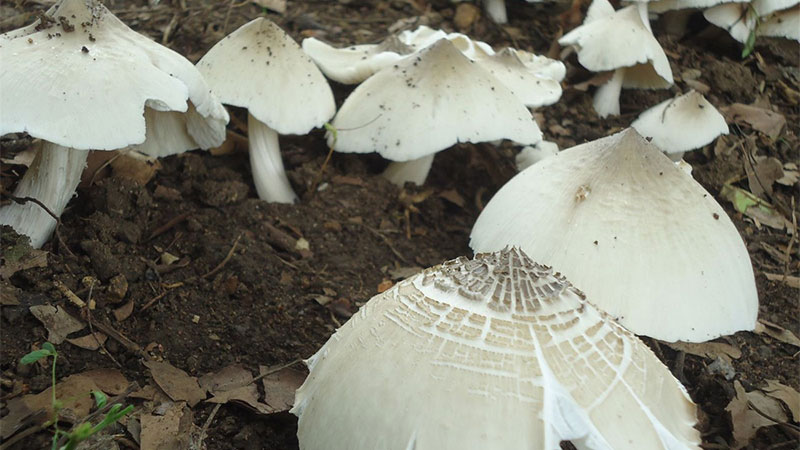 Termitomyces mushrooms, known scientifically as collybia albuminosa, belong to the Lyophyllaceae family.
Termitomyces mushrooms, known scientifically as collybia albuminosa, belong to the Lyophyllaceae family.
2 Types of Termitomyces Mushrooms
There are two main types of Termitomyces mushrooms: natural white Termitomyces and black Termitomyces. Both varieties are delicious and packed with nutritional value, but they differ in flavor, color, chemical composition, and nutritional content.
Natural White Termitomyces
-
Natural white Termitomyces are found only in areas with termite mounds, specifically those underground rather than in trees. They have a white color, with the inside of the cap also white. The outside is grayish and slightly slippery, while the base is slightly yellowish.
-
According to researchers, consuming these mushrooms regularly offers health benefits, especially for the sick and elderly. They are believed to boost immunity, fight cancer cells, and lower blood sugar levels.
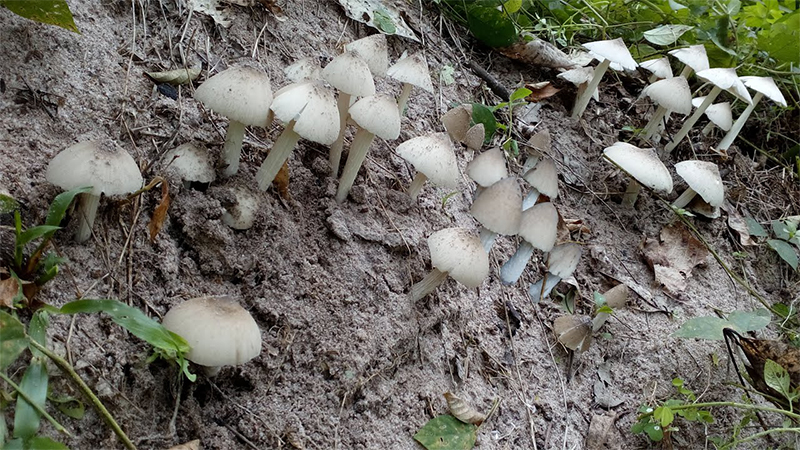 Natural white Termitomyces mushrooms.
Natural white Termitomyces mushrooms.
Black Termitomyces
-
Black Termitomyces are cultivated in a controlled, enclosed environment where temperature can be regulated. They are known for their special medicinal properties in both Eastern and Western medicine.
-
These mushrooms grow to about 10-15cm in length and 0.5-1.5cm in radius. The outer layer is black, while the white flesh is sweet and crunchy. Their crisp texture, firm body, and aromatic flavor make them an excellent ingredient for delicious meals.
 Black Termitomyces mushrooms are cultivated by humans.
Black Termitomyces mushrooms are cultivated by humans.
3 Benefits of Termitomyces Mushrooms
Regulate Women’s Menstrual Cycles
According to ancient Chinese records, royal physicians in the imperial court used these mushrooms to help regulate the menstrual cycles of the concubines. Therefore, Termitomyces mushrooms are beneficial for women who experience menstrual disorders.
 Termitomyces mushrooms help regulate menstrual cycles.
Termitomyces mushrooms help regulate menstrual cycles.
Boost Immunity
Termitomyces mushrooms are a nutritious food that significantly boosts immunity, thanks to their high content of protein and fiber, making them an effective preventive measure against seasonal illnesses and common colds.
 Termitomyces mushrooms strengthen the immune system.
Termitomyces mushrooms strengthen the immune system.
Promote Bone Health
Rich in calcium, phosphorus, and other minerals, Termitomyces mushrooms are excellent for improving bone health, especially in the elderly. The combination of calcium and other minerals helps reduce the risk of bone-related diseases.
The essential nutrients in these mushrooms also help reduce the incidence of diseases, especially in the elderly and the sick.
 Termitomyces mushrooms promote bone health.
Termitomyces mushrooms promote bone health.
Prevent Cancer
Regular consumption of Termitomyces mushrooms helps inhibit tumor growth and the spread of harmful viruses. Additionally, they increase the success rate of cancer treatment, slow down tumor development, and prolong the time before metastasis, giving patients more time to fight the disease.
 Termitomyces mushrooms help prevent cancer.
Termitomyces mushrooms help prevent cancer.
Other Benefits of Termitomyces Mushrooms
These mushrooms offer various other health benefits and support the treatment of various ailments, including detoxification, bowel cleansing, and more.
For those who work in stressful and tiring environments, Termitomyces mushrooms can help regulate the nervous system, reduce stress, and promote better sleep.
4 Delicious Dishes Made with Termitomyces Mushrooms and Their Recipes
Grilled Termitomyces Mushrooms in Foil
Ingredients
-
400 grams of Termitomyces mushrooms
-
Aluminum foil
Spices: Spring onion, chili, salt, sugar, seasoning powder, pepper, cooking oil.
Preparation
Clean the mushrooms and soak them in diluted salt water, then drain and set aside. In a bowl, mix the mushrooms with the following ingredients: chopped spring onion, chili, salt, sugar, seasoning powder, crushed pepper, and cooking oil. Make sure the mushrooms are well coated.
Next, spread out a sheet of aluminum foil and place the seasoned mushrooms on it. Roll up the foil and put it in the oven. Bake at 200 degrees Celsius for about 20 minutes.
Note: Do not over-bake the mushrooms, as they will become soft and lose their appealing texture.
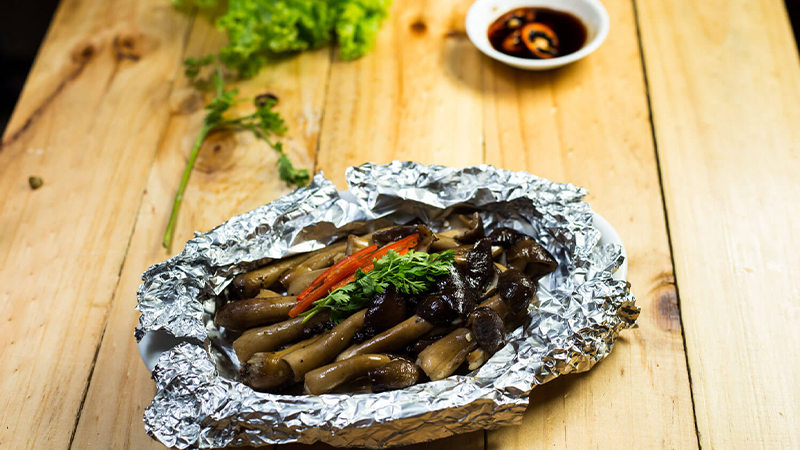 Grilled Termitomyces mushrooms in foil.
Grilled Termitomyces mushrooms in foil.
Stir-fried Termitomyces Mushrooms with Luffa
Ingredients
-
200 grams of Termitomyces mushrooms
-
1 luffa
-
Spices
Spices: Sugar, salt, pepper, fish sauce, etc.
Preparation
Peel and clean the mushrooms, then set them aside to drain. Peel and clean the luffa, then cut it into bite-sized pieces. Chop the spring onion into sections.
Heat a pan and add cooking oil. Fry the chopped garlic and onion, then add the mushrooms and stir-fry over high heat. Season with a teaspoon of sugar, a teaspoon of seasoning powder, and fish sauce to taste. Add the luffa and continue stir-frying for 3-5 minutes before turning off the heat. Finally, add the spring onion and pepper, and it’s ready to serve.
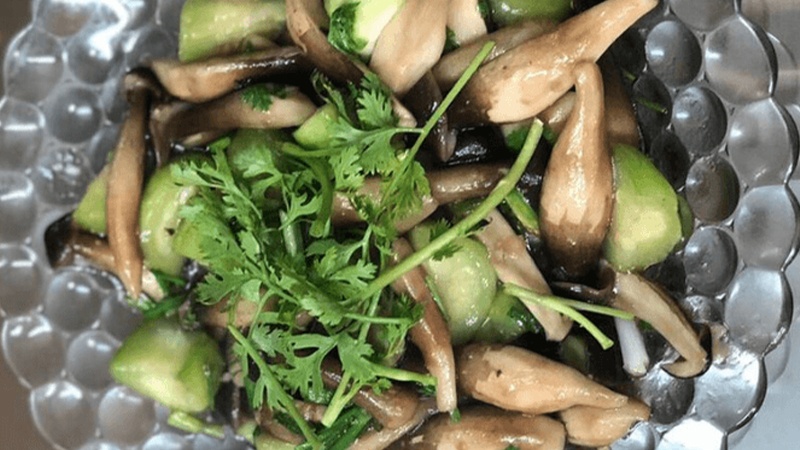 Stir-fried Termitomyces mushrooms with luffa.
Stir-fried Termitomyces mushrooms with luffa.
Termitomyces Mushroom and Shrimp Porridge
Ingredients
-
100 grams of rice
-
Termitomyces mushrooms (200 grams)
-
30 grams of fresh shrimp
Spices: Fish sauce, salt, seasoning powder, spring onion.
Preparation
First, soak the rice for about 30 minutes to soften it, then rinse and mix with chopped shallots. Let it drain and dry, then fry the rice until it turns golden brown.
Boil water in a pot and add the rice to make porridge (the amount of water depends on your preferred consistency). When the porridge is soft, add the cleaned mushrooms and stir-fry them with shallots in a pan. Peel and clean the shrimp, then mince them with shallots and marinate for 5-10 minutes with fish sauce and seasoning powder.
Using the same pan, fry the shrimp with shallots until they are cooked and fragrant. When the porridge is soft, add the shrimp and mushrooms, season to taste, and mix well. Your delicious porridge is now ready to be served.
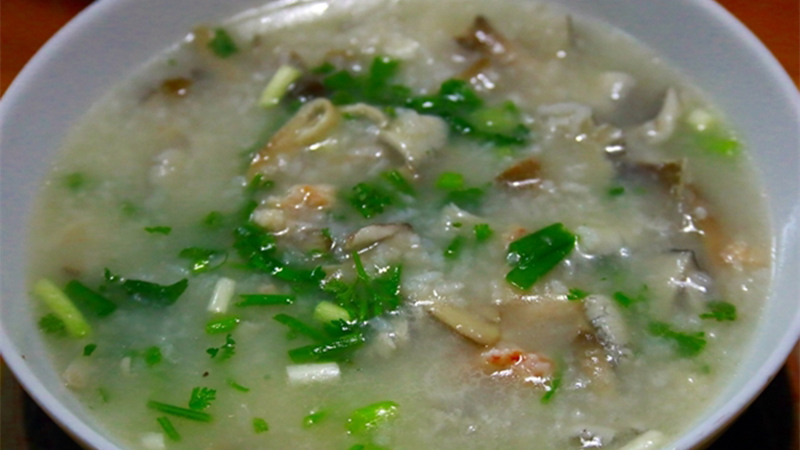 Termitomyces mushroom and shrimp porridge.
Termitomyces mushroom and shrimp porridge.
Termitomyces Mushroom and Vegetable Soup
Ingredients
-
1 bunch of
-
100 grams of cleaned Termitomyces mushrooms
-
1 teaspoon of seasoning powder
Spices: Sugar, salt, pepper, fish sauce, etc.
Preparation
Soak the mushrooms in diluted salt water, then drain and set aside. Cut the lang rau into 3cm sections.
Boil water in a pot and add the seasoning powder. Put in the lang rau and mushrooms, and season to taste. Simmer for about 5 minutes before serving.
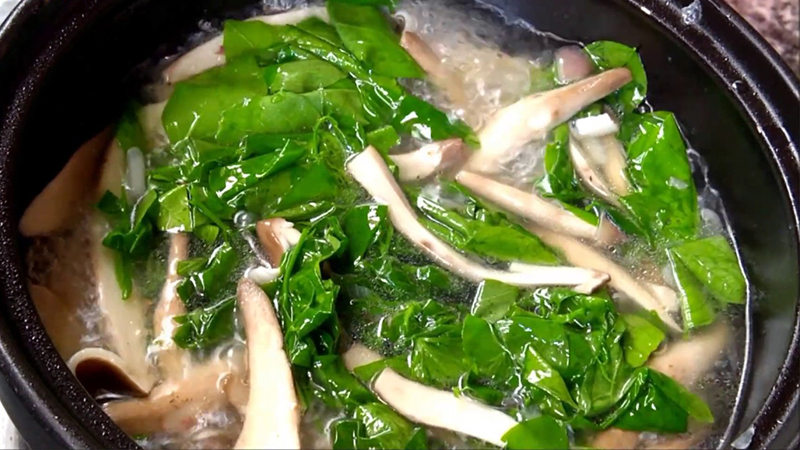 Termitomyces mushroom and vegetable soup.
Termitomyces mushroom and vegetable soup.
5 Where to Buy Termitomyces Mushrooms and Their Price
Termitomyces mushrooms are not only delicious and nutritious but also have high economic value. At the beginning of the rainy season, natural white Termitomyces mushrooms are sold in many markets in the Mekong Delta region, with prices ranging from 300,000 to 500,000 VND per kg. The purchasing price in the gardens is around 200,000 to 400,000 VND per kg.
Black Termitomyces mushrooms are cheaper and are usually sold in packages: 200g tray for 8

































